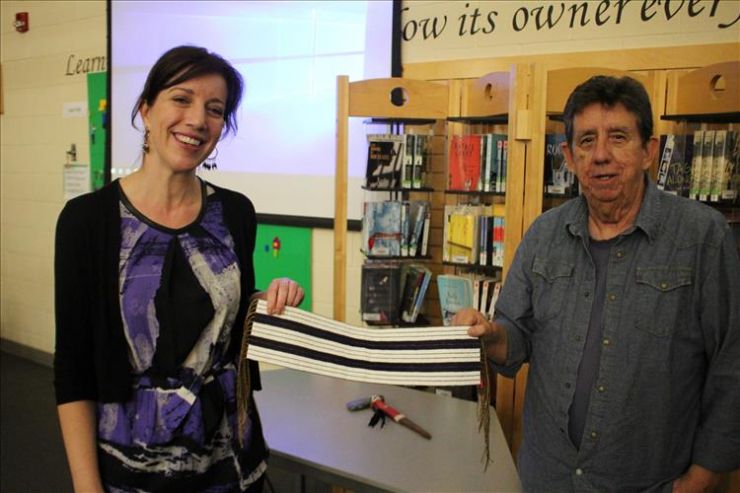Treaties Recognition Week
“The problem with history is it’s his story, not our story,” says Tom Porter, knowledge keeper and Bear Clan elder of the Mohawk nation. He’s speaking to a group of Grand Erie educators and staff ahead of Treaties Recognition Week in Ontario, sharing some of the lessons imparted in his book, And Grandma Said, a collection of Iroquois teachings passed down through oral tradition.

On the same day, at Brantford Collegiate Institute and Vocational School, Teacher Librarian Kate Johnson-McGregor is guiding a discussion with students visiting from James Hillier Public School. On a screen in front of them is a map of Ontario showing significant sites in treaty agreements over the past 300 years.
“What if history had been written from an Indigenous perspective?” she asks. “How might things be different?”
The first week of November is Treaties Recognition Week, a time to provide education on treaty rights, and honour the histories that weren’t always part of the curriculum.
Brantford Collegiate Institute and Vocational School was the site of a ‘Living Library’ event. Guest speakers included elder and historian David Plain and filmmaker Monica Virtue. Using an interactive map, they presented the interwoven history of European settlers to North America and the Indigenous peoples for whom Turtle Island was already home.
“So many people don’t realize how many land agreements and treaties there were, let alone how many have been broken since they were signed,” explains Plain. “Treaties Week is an important opportunity to tell the true history of the land.”
The ‘Living Library’ program brings this to life, providing students with an understanding of the country’s whole history thanks to local Indigenous elders and knowledge keepers who are invited into libraries to act as “talking books,” teaching students about treaties and our obligations in honouring treaty rights. A natural partnership between the Ontario School Libraries Association and the Ministry of Indigenous Relations and Reconciliation, these events support the goals of active, lifelong inquiry, with an open commitment to social justice and equity.

Caption: Monica Virtue and David Plain hold a Two Row wampum
“It’s an honour to host this event and to create this space for everyone, while making visible such important issues” says Johnson-McGregor. “We are all treaty people; this is a history we’re all a part of.”
Knowledge is powerful. As part of its Multi-Year Plan, Grand Erie is committed to Equity, and Treaties Recognition Week is another means to increase the sense of belonging among all students.
Grand Erie classrooms will be highlighting Treaties Recognition Week throughout the month of November. A second Living Library event takes place at Brantford Collegiate Institute and Vocational School on November 14.
Healthy Bites Success for Graham Bell-Victoria Students
Graham Bell-Victoria School has been presented with a GOLD award of recognition and achievement in the Healthy Bites Program. The staff and students have worked hard and enjoyed the “fruits” of their labour as they have now been recognized with GOLD!
Throughout the year, Sonia Martin, school health nurse with the Brant County Health Unit, has lead our staff and students in a variety of healthy eating awareness activities. These included a Mystery Fruit and Vegetable contest, a trivia question in the monthly newsletter, and healthy fruit and vegetable snacks every Friday. These tasty treats, prepared by the grade 4-5 class were a big hit and helped us learn about the benefits of eating healthy.
Next year the program will be expanded to Healthy Steps and Healthy Bites, a program in which we will learn about and practice healthy eating and healthy activity. Congratulations, Graham Bell!
Voluntary Aboriginal Self-Identification
The Grand Erie District School Board recognizes the importance of school success for Aboriginal students. Our dedicated staff members are committed to improving services and programs for Aboriginal students attending school in the Board.
With a goal to improve the school experience for all Aboriginal students, the Board encourages the development of strong partnerships with Aboriginal families, communities and organizations, both on and off the reserve.
Through the Voluntary Aboriginal Self-Identification process, Aboriginal parents and students will have access to additional support services, including educational, social, and emotional supports that focus and foster Aboriginal identity, culture and values.
There are three categories of Voluntary Aboriginal Self-Identification – First Nation, Métis, or Inuit.
Your child may bring a GEDSB Voluntary Aboriginal Self-Identification form home or if not, you can contact your child’s school to receive a form. You can also, visit the Aboriginal Education section under the Program tab at www.granderie.ca for more information and a copy of the Voluntary Self-Identification form.
More News

